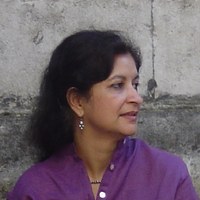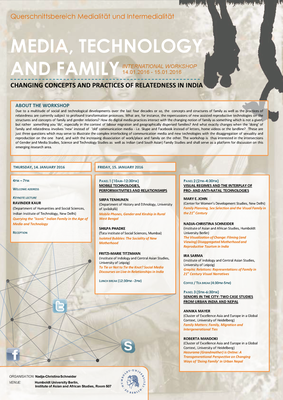14. 01. Querying the "Iconic" Indian Family in the Age of Media and Technology - Vortrag von Prof. Ravinder Kaur (IIT, New Delhi)
Prof. Kaur (Department of Humanities and Social Sciences, Indian Institute of Technology, New Delhi) hält die Keynote Lecture im Rahmen des internationalen Workshops "Media, Technology and Family. Changing Concepts and Practices of Relatedness in India".
- https://www.iaaw.hu-berlin.de/de/region/suedasien/gesellschaften/veranstaltung/archiv/veranstaltungen-2016/14-01-querying-the-iconic-indian-family-in-the-age-of-media-and-technology-vortrag-von-prof-ravinder-kaur-iit-new-delhi
- 14. 01. Querying the "Iconic" Indian Family in the Age of Media and Technology - Vortrag von Prof. Ravinder Kaur (IIT, New Delhi)
- 2016-01-14T16:00:00+01:00
- 2016-01-14T19:00:00+01:00
- Prof. Kaur (Department of Humanities and Social Sciences, Indian Institute of Technology, New Delhi) hält die Keynote Lecture im Rahmen des internationalen Workshops "Media, Technology and Family. Changing Concepts and Practices of Relatedness in India".
- Wann 14.01.2016 von 16:00 bis 19:00
- Wo IAAW, Raum 507
-
iCal
Abstract zum Vortrag von Prof. Ravinder Kaur:

Querying the "Iconic" Indian Family in the age of media and technology
For long, social anthropology as well as the nationalist discourse had privileged the joint family as an iconic institution of Indian civilization and society, together with caste and village. Post-independence sociological inquiry has since interrogated the assumed generalized prevalence of the joint family to argue its specificity to space and class locations, in the past as well as in the present. As an ideal, however, the joint family (or in contemporary India, the close knit nuclear family), continues to resonate strongly in the Indian social imaginary and against which we often measure the deterioration/disintegration of "Indian culture". Modernization and western influences are often held as threatening traditional Indian culture, at the core of which is the "glued-together" family, as Amartya Sen calls it. In the contemporary era, work-driven migration and new technologies are the forces being perceived as posing a threat to the united Indian family. While the form and shape of the family might be transforming due to demographic and socio-economic shifts, the interior bonds and emotions anchoring the family as the centre-piece of an Indian's life are expected to remain strong. In this presentation, I look at the confluence of factors that is leading to family change and within these factors, I look specifically at how technological interventions in the family might be transforming the manner of "doing family" among contemporary Indians. I draw examples from three domains of social life: 1)Technologies of sex determination, sex selection and NRTs/ARTS 2) ICTs (new communication technologies) that by allowing communication at a distance shape and reshape intimate relationships between and within families. An example is the manner in which these new communication technologies allow the "doing of family" between transnational migrants and their families back home and 3) the role, specifically, of mobile phones in transforming youth intimacies and how runaway marriages challenge family norms of arranged marriage and prohibited pre-marital intimacies.
Keynote Lecture im Rahmen des internationalen Workshops "Media, Technology and Family. Changing Concepts and Practices of Relatedness in India".


